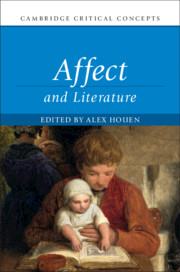Book contents
- Affect and Literature
- Cambridge Critical Concepts
- Affect and Literature
- Copyright page
- Contents
- Notes on Contributors
- Introduction
- I Origins
- Chapter 1 Poetic Fear-Related Affects and Society in Greco-Roman Antiquity
- Chapter 2 Secondary Affect in Lessing, Mendelssohn, and Nicolai
- Chapter 3 Affect and Life in Spinoza, Nietzsche, and Bergson
- Chapter 4 Feelings under the Microscope: New Critical Affect
- Chapter 5 ‘We Manufacture Fun’: Capital and the Production of Affect
- Chapter 6 Jacques Lacan’s Evanescent Affects
- Chapter 7 The Durability of Affect and the Ageing of Gay Male Queer Theory
- Chapter 8 Affect, Meaning, Becoming, and Power: Massumi, Spinoza, Deleuze, and Neuroscience
- Chapter 9 Translating Postcolonial Affect
- Chapter 10 Making Sorrow Sweet: Emotion and Empathy in the Experience of Fiction
- II Developments
- III Applications
- Index
Chapter 5 - ‘We Manufacture Fun’: Capital and the Production of Affect
from I - Origins
Published online by Cambridge University Press: 16 January 2020
- Affect and Literature
- Cambridge Critical Concepts
- Affect and Literature
- Copyright page
- Contents
- Notes on Contributors
- Introduction
- I Origins
- Chapter 1 Poetic Fear-Related Affects and Society in Greco-Roman Antiquity
- Chapter 2 Secondary Affect in Lessing, Mendelssohn, and Nicolai
- Chapter 3 Affect and Life in Spinoza, Nietzsche, and Bergson
- Chapter 4 Feelings under the Microscope: New Critical Affect
- Chapter 5 ‘We Manufacture Fun’: Capital and the Production of Affect
- Chapter 6 Jacques Lacan’s Evanescent Affects
- Chapter 7 The Durability of Affect and the Ageing of Gay Male Queer Theory
- Chapter 8 Affect, Meaning, Becoming, and Power: Massumi, Spinoza, Deleuze, and Neuroscience
- Chapter 9 Translating Postcolonial Affect
- Chapter 10 Making Sorrow Sweet: Emotion and Empathy in the Experience of Fiction
- II Developments
- III Applications
- Index
Summary
This chapter examines the critique of the production of affect advanced by a range of thinkers in the Marxist tradition, above all, Theodor Adorno, but also including Herbert Marcuse, Raymond Williams, and E. P. Thompson. It focuses in particular on what Adorno describes as the ‘diversionary function’ of ostensibly positive affective states – especially what he calls ‘fun’, a multiply freighted word, as the chapter shows – and asks what it means to categorise such states as ‘false’. The degree to which affective states are open to misinterpretation by those undergoing them is, therefore, a central question in this chapter. Drawing on Keston Sutherland’s recent emphasis on the role of disgust in Marx’s satirical account of capitalist production, the chapter will in conclusion emphasise the affective charge of the Marxist critique of affect itself.
- Type
- Chapter
- Information
- Affect and Literature , pp. 100 - 115Publisher: Cambridge University PressPrint publication year: 2020

